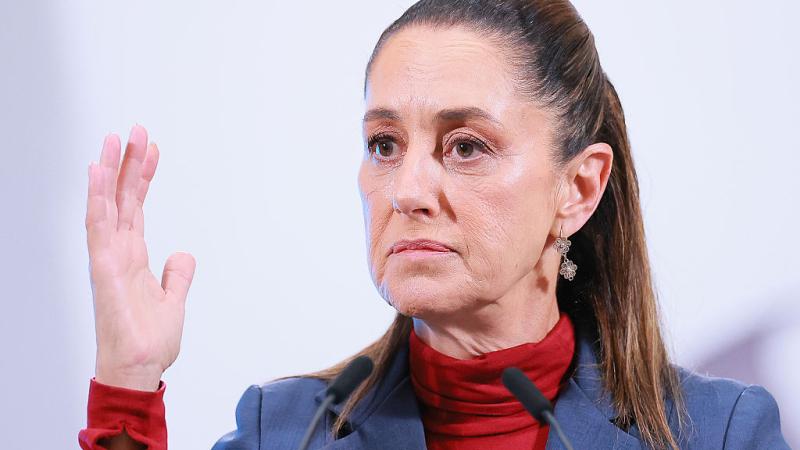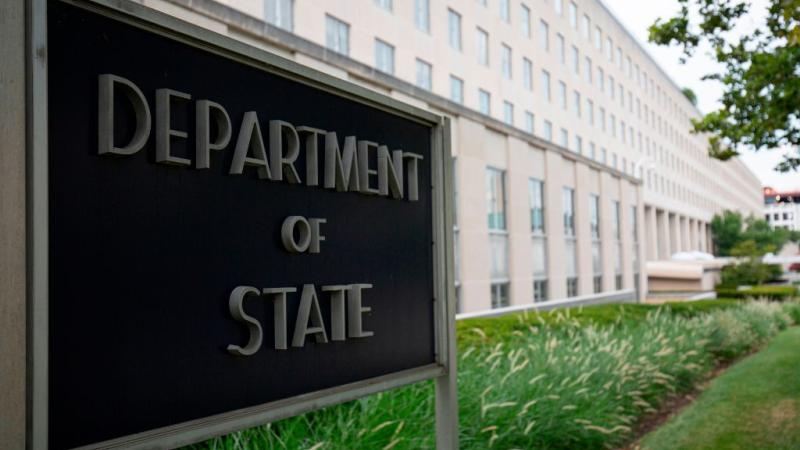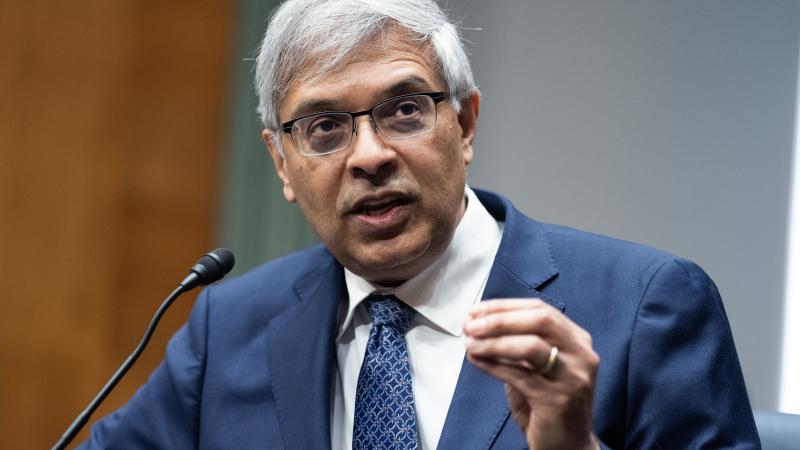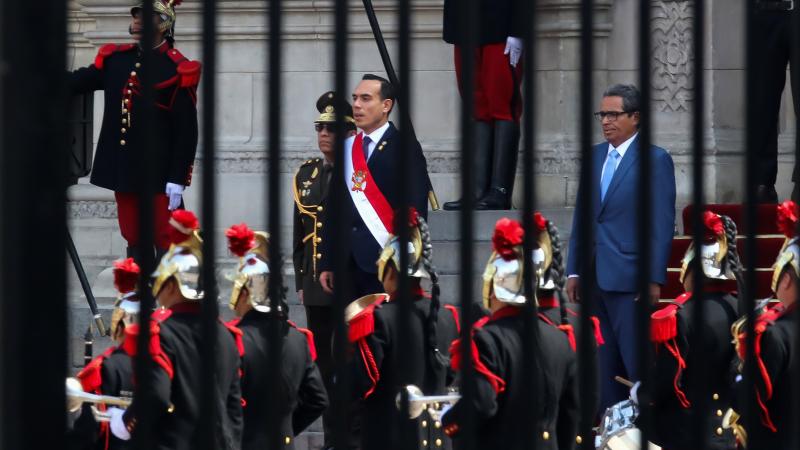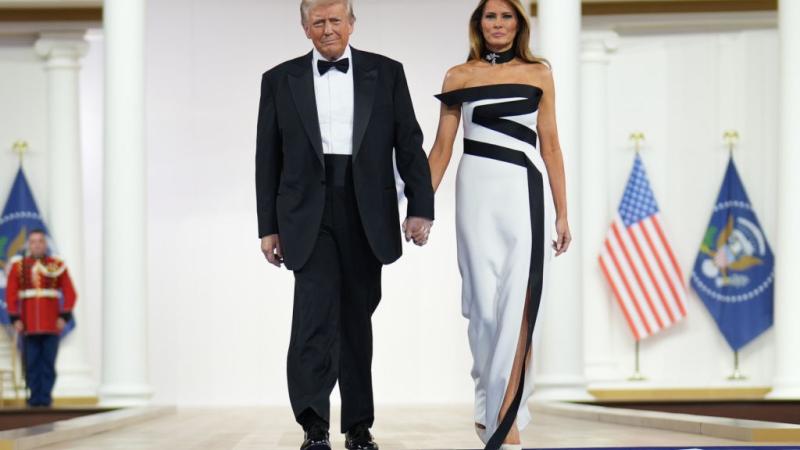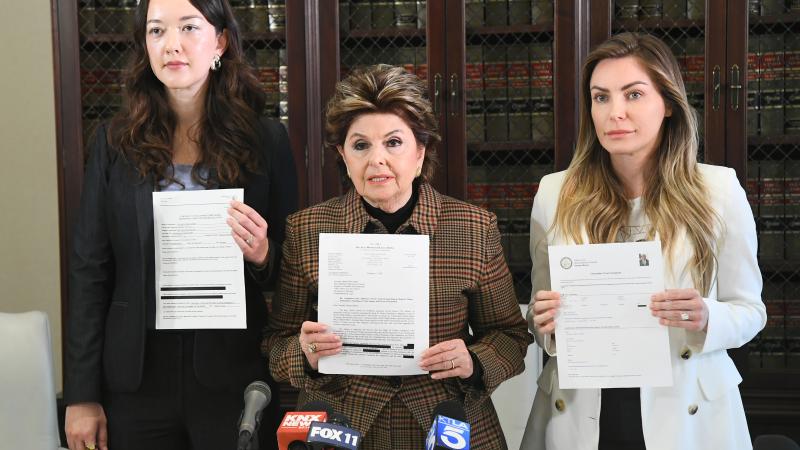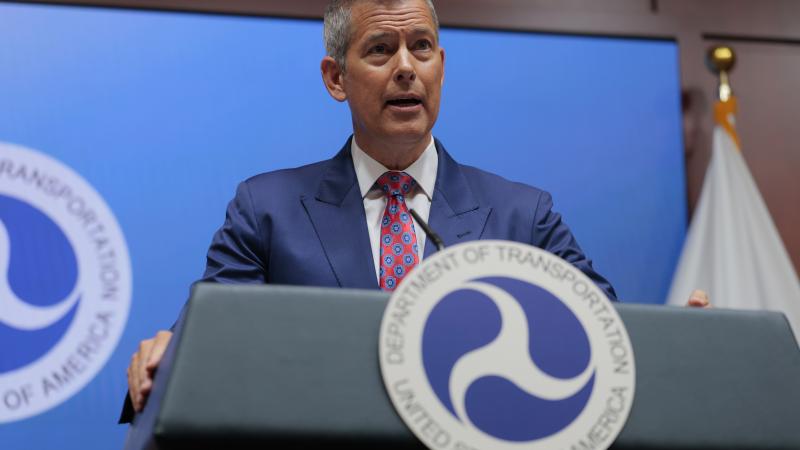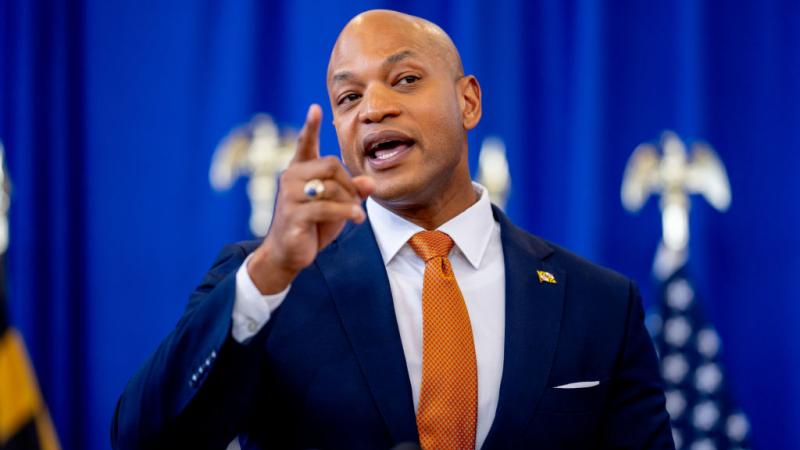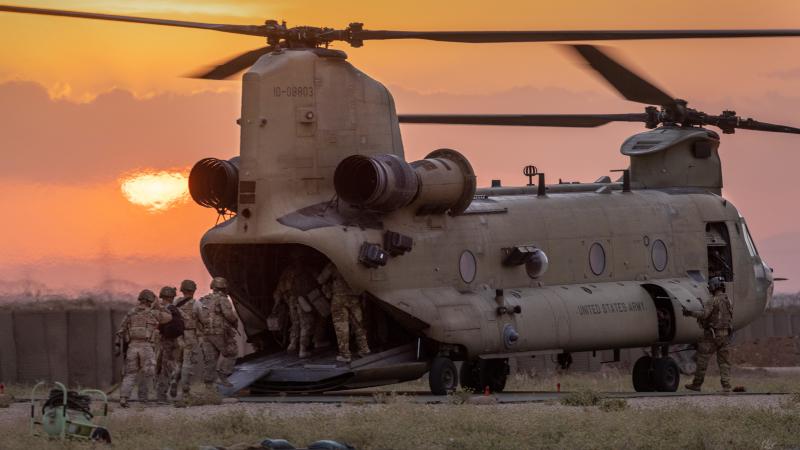Pentagon, DEA, Mexican forces hold intel training aimed at 'putting an end to the godless cartels'
The Pentagon under Pete Hegseth continues to increase the U.S. military's role in securing the southern border and confronting cartels long-engaged in human trafficking and drug production and distribution.
The Defense Department and Drug Enforcement Agency held an intelligence-sharing effort with Mexican security forces this week in Texas as the Trump administration ramps up its efforts to crack down on the drug cartels that traffic illicit drugs and illegal aliens — many of them women and minors sold into the sex trade — across the southern border.
U.S. defense sources — who declined to be named due to the sensitivity of the collaboration between the Pentagon, the DEA, and elements of the Mexican government’s security apparatus — told Just the News that there was a quiet U.S.-Mexico collaboration effort this week just across the Rio Grande in western Texas.
A senior defense official who attended the event told Just the News that the interagency is working together like never before to carry out President Trump’s agenda of stopping the flow of deadly drugs that are killing thousands and thousands of Americans each year. The senior defense official also said that the Pentagon is committed to being a leading force in locking down the Southern Border and putting an end to what he described as "the godless cartels."
Southern Border a key priority at the Pentagon
The joint interagency training event occurred at the DEA El Paso Intelligence Center — dubbed “EPIC” — and was described as a “collaboration” between U.S. federal agencies and Mexican security forces, according to a defense source who also said the training event was designed to facilitate real-time information sharing, planning, and collaboration on joint efforts to counter cartel operations.
The defense source also said that Mexican security forces were in attendance on Wednesday at EPIC for several briefings related to the joint interagency collaboration to combat the cartels which are operating inside Mexico and smuggling drugs into the United States.
Defense Secretary Pete Hegseth has made securing the southern border a key priority at the Pentagon, including the establishment of Joint Task Force - Southern Border and the deployment of thousands of U.S. troops along the border between the U.S. and Mexico. The effort between the Pentagon and the DEA is the latest attempt to increase coordination with Mexican security forces in the oft-frought efforts against powerful Mexican drug cartels.
Another senior defense official who attended the event but declined to be named, told Just the News that in the interest of increased international cooperation, DEA hosted an information-sharing event that took place at the El Paso Intelligence Center (EPIC) in El Paso, Texas. The event consisted of representatives from the DEA, DoD, and Government of Mexico Security Forces.
Purportedly, the information-sharing event that was hosted by the DEA gave all participants a better understanding of the operational environment, resources available, and authorities under President Trump’s executive order.
The DEA says EPIC is “comprised of 21 participating agencies who share a common quest: identifying threats to the nation, with an emphasis on the Southwest border.” The intelligence site is described as “an all-threats center with a focus on the Western Hemisphere, and a particular emphasis on the Southwest border.”
“Securing Our Borders”
A defense source said that the U.S.-Mexico training mission centered on fulfilling the priorities of Trump and Hegseth related to countering cartels that are a direct threat to the national security of the United States.
The defense source characterized the Defense Department as taking the lead on this mission, and emphasizing the interagency approach and pointed to the involvement of Trump administration leaders including Hegseth, DEA Administrator Terrence Cole, FBI Director Kash Patel and DHS Secretary Kristi Noem.
The defense source pointed to two main executive orders (EO) issued by Trump on Inauguration Day in January which Hegseth and the U.S. military were carrying out.
The first order was titled “Designating Cartels and Other Organizations as Foreign Terrorist Organizations and Specially Designated Global Terrorists.” The EO argued that “international cartels constitute a national-security threat beyond that posed by traditional organized crime.” The EO also stated that “the Cartels functionally control, through a campaign of assassination, terror, rape, and brute force nearly all illegal traffic across the southern border of the United States” and that “in certain portions of Mexico, they function as quasi-governmental entities, controlling nearly all aspects of society.”
The Day One directive from Trump said that “it is the policy of the United States to ensure the total elimination of these organizations’ presence in the United States and their ability to threaten the territory, safety, and security of the United States through their extraterritorial command-and-control structures.”
The second executive order was simply titled “Securing our Borders” and argued that “a nation without borders is not a nation, and the Federal Government must act with urgency and strength to end the threats posed by an unsecured border” and that “one of my most important obligations is to protect the American people from the disastrous effects of unlawful mass migration and resettlement.” Trump declared that his “Administration will marshal all available resources and authorities to stop this unprecedented flood of illegal aliens into the United States.”
Hegseth: "We defend our soil"
The Defense Department has said that U.S. troops “have been working alongside Customs and Border Protection since January to seal the southern border.” The effort, officially dubbed Joint Task Force-Southern Border in March, is run by U.S. Northern Command and currently involves the deployment of thousands of U.S. troops to help secure the U.S.-Mexico border.
The U.S. military assumed control of the "New Mexico National Defense Area" in April, with the operation tied to Fort Huachuca, an Army base in nearby Arizona. Hegseth visited the National Defense Area near the U.S. southern border with Mexico later that month.
“Under this administration, we defend our soil,” Hegseth said at the time. “We know who comes in, and if you try to come in illegally as a cartel, you try to smuggle or traffic, you will be DETAINED by members of the U.S. military, and you will be handed over to Customs and Border Patrol, and then you will be prosecuted by the Department of Justice, and you will be charged to the maximum extent of the law.”
The U.S. military then assumed control of the “Texas National Defense Area” in May, with the effort tied to Fort Bliss, an Army base in southern Texas.
The Pentagon’s chief spokesman, Sean Parnell, said last month that, as of that time, the task force had conducted more than 3,500 patrols, including more than 150 that were jointly carried out with CBP and the Mexican military.
The Defense Department currently has a webpage dedicated to detailing the “DOD Support to the Southern Border.” The webpage notes that “Trump declared a national emergency at the southern border of the United States. Trump directed the Defense Department to take all appropriate action to support the activities of the secretary of Homeland Security in obtaining complete operational control of the southern border.”
The Pentagon on Thursday added to a running photo collection depicting how “U.S. service members continue to support efforts carrying out President Donald J. Trump's executive orders on protecting the territorial integrity of the United States.”
DEA and Mexico disagree on ‘Project Portero’
The DEA had announced a “major new initiative to strengthen collaboration between the United States and Mexico in the fight against cartels” on Monday, with Mexico’s president quickly attempting to shoot it down.
The DEA said that at the core of its effort was Project Portero, described as “DEA’s flagship operation aimed at dismantling cartel ‘gatekeepers’ — operatives who control the smuggling corridors along the Southwest Border.” The DEA said that “by specifically targeting” these gatekeepers, DEA and its partners “are striking at the heart of cartel command-and-control.”
The agency said Project Portero is also coordinated with the Homeland Security Task Force, and that integration with the task force “brings together law enforcement, intelligence, defense, and prosecutorial elements, aligning priorities and operations so the United States can apply its full capabilities against cartel networks.”
Mexican President Claudia Sheinbaum sought to quickly distance Mexico from the announcement on Monday.
“The DEA put out a statement yesterday saying that there is an agreement with the Mexican government for an operation called Portero,” Sheinbaum said according to a translation by the Associated Press. “There is no agreement with the DEA. The DEA puts out this statement, based on what? We don’t know. We have not reached any agreement, none of the security institutions have with the DEA.”
Sheinbaum said that "the DEA issued this statement — we do not know on what basis,” according to a translation by Reuters, adding, “We have not reached any agreement through any of the security agencies with the DEA. We do not know why they put out this statement."
Mexico and the fentanyl crisis
When the Trump White House announced tariffs against Mexico in March, it pointed to the fentanyl crisis inside the United States.
The Centers for Disease Control and Prevention reported that there were “80,391 drug overdose deaths in the United States during 2024 — a decrease of 26.9% from the 110,037 deaths estimated in 2023.” The CDC estimated that more than half of these drug overdose deaths — 48,422 in 2024 and 76,282 in 2023 — involved synthetic opioids, mainly fentanyl.
“Mexican drug trafficking organizations, the world’s leading fentanyl traffickers, operate unhindered due to an intolerable relationship with the government of Mexico,” the White House said in March. “The government of Mexico has afforded safe havens for the cartels to engage in the manufacturing and transportation of dangerous narcotics, which collectively have led to the overdose deaths of hundreds of thousands of American victims. Mexican drug cartels are known for extreme brutality, corruption, and control over entire regions of Mexico.”
The Mexican president responded in March that “there is no reason, motive, or justification for this decision which will harm our peoples and nations.”
Sheinbaum continued: “We have said this clearly: cooperation and coordination, yes; subordination and interventionism, no. Mexico must be respected; we are equal nations. For humanitarian reasons, we collaborate to prevent illegal drug trafficking to the United States, but as we have said many times, the U.S. government must also confront the opioid crisis that has caused countless deaths in its own country.”
Targeting the cartels, gangs
The Trump administration has significantly ramped up U.S. efforts aimed at Mexican and other international drug cartels.
The New York Times, citing unnamed sources, reported earlier in August that “President Trump has secretly signed a directive to the Pentagon to begin using military force against certain Latin American drug cartels that his administration has deemed terrorist organizations.”
The Wall Street Journal then reported earlier this week that “President Trump has ordered the Pentagon to send three Navy warships to interdict drug cartels off the coast of South America, including near Venezuela, expanding the Pentagon’s role in combating illegal drug smuggling and intensifying a U.S. confrontation with the country’s president, Nicolas Maduro.”
The Trump administration had designated the Venezuelan gang Tren de Aragua as a foreign terrorist organization in February. Trump in March then invoked the Alien Enemies Act (AEA) of 1798 in an executive order, and argued that members of the Venezuelan gang “unlawfully infiltrated the United States and are conducting irregular warfare and undertaking hostile actions against the United States” and that “TdA is closely aligned with, and indeed has infiltrated, the Maduro regime, including its military and law enforcement apparatus.”
The leaders of the FBI and the Office of the Director of National Intelligence insisted in April that TdA works in coordination with the regime of Venezuelan strongman Maduro following “twisted” and “illegal” classified leaks which claimed that at least some spy agencies did not believe this to be the case.
Gabbard and Patel say Maduro supports the gang
Director of National Intelligence Tulsi Gabbard and FBI Director Kash Patel were prompted to publicly argue that the Venezuelan gang — also called the Aragua Train — is in fact linked to the Maduro regime after purported classified leaks earlier this year. The leaks purportedly cast doubt on the U.S. intelligence community’s National Intelligence Council position that TdA is cooperating with Venezuela’s socialist leader Maduro, the successor to dictator Hugo Chavez.
“The weaponization of intelligence to undermine the President’s agenda is an assault on democracy. Those behind this illegal leak of classified intelligence, twisted and manipulated to convey the exact opposite finding, will be held accountable under the full force of the law … Rooting out this politicization of intelligence is exactly what President Trump campaigned on and what Americans overwhelmingly voted for,” Gabbard said in an April tweet.
“The Office of the Director of National Intelligence fully supports the assessment that the foreign terrorist organization, Tren De Aragua, is acting with the support of the Maduro Regime, and thus subject to arrest, detention, and removal as alien enemies of the United States.”
A senior intelligence official who declined to be named told Just the News in April that TdA leaders have historically been located and broadly benefited from conditions in Venezuela created by the Venezuelan government. FBI Director Patel tweeted in April that “the FBI assesses some members of the Maduro regime have links to TdA members who look to use those ties to advance their criminal objectives” and that “we stand by this assessment and consider TdA's presence a direct threat to our national security.”
“Tren de Aragua is an extremely violent, highly organized transnational gang,” Patel also said. "Together with our law enforcement partners, we are actively working to identify, disrupt, and dismantle their networks. We will not allow foreign-backed criminal organizations to take root in our communities.”
Chinese and Mexican drug lords
Chinese money launderers and fentanyl-makers have gone into business with Mexican drug cartels and have made billions pushing fentanyl across the U.S. border, The Wall Street Journal reported in February.
The Trump administration pressured Chinese leader Xi Jinping in 2019 to criminalize fentanyl there, but drug labs in Wuhan and elsewhere that made most of the fentanyl injected into the U.S. shifted to manufacturing the precursor ingredients for the drugs instead, and Chinese partnerships with drug traffickers in Mexico reportedly expanded.
Biden's DEA Administrator Anne Milgram said on C-SPAN in 2022 that two major cartels in Mexico — the Sinaloa Cartel and the Jalisco New Generation Cartel — were the driving force behind getting fentanyl across the U.S. border, calling the groups “the greatest threat” facing U.S. communities. She emphasized that the cartels work closely with co-conspirators in China to obtain the necessary precursor for their drugs and to launder their illegal profits.
“These cartels are responsible for virtually all the fentanyl, and they currently dominate the worldwide fentanyl distribution and supply chain. They are sourcing these precursor chemicals from China, which are the building blocks of synthetic and man-made fentanyl,” Milgram said in a 2024 press conference. "They are in charge of the production of the fentanyl that is happening across Mexico. They are operating the transportation networks that are bringing the fentanyl into the United States. They run and oversee the sales of fentanyl on social media and in our cities, our communities, and our towns.”
House Committee says fentanyl trafficking a deliberate strategy
The then-DEA leader said at the time that the DEA’s “top operational priority” is to “defeat” the cartels, and that the agency’s “core mission” is to “target those two networks as they operate worldwide, from China to Mexico to the United States.”
The Select Committee on the Strategic Competition Between the U.S. and the Chinese Communist Party issued a report in 2024 arguing that the Chinese government was carrying out a deliberate strategy of pushing fentanyl into the United States.
This House Select Committee on the CCP “established that the PRC government, under the control of the CCP, directly subsidizes the manufacturing and export of illicit fentanyl materials and other synthetic narcotics through tax rebates.” The House report also found that the CCP “gave monetary grants and awards to companies openly trafficking illicit fentanyl materials and other synthetic narcotics” and that the Chinese government “strategically and economically benefits from the fentanyl crisis.”
Trump announced in February that he was imposing duties on China due in part to their role in the fentanyl crisis.
“The Chinese Communist Party, which exerts ultimate control over the government and enterprises of the PRC, has subsidized and otherwise incentivized PRC chemical companies to export fentanyl and related precursor chemicals that are used to produce synthetic opioids sold illicitly in the United States,” Trump’s order said.
“Furthermore, the PRC provides support to and safe haven for PRC-origin transnational criminal organizations that launder the revenues from the production, shipment, and sale of illicit synthetic opioids.”
The Facts Inside Our Reporter's Notebook
Links
- establishment
- says
- two
- main
- titled
- order
- said
- "New Mexico National Defense Area"
- said
- Texas National Defense Area
- said
- said
- said
- webpage
- declared a national emergency
- depicting
- announced
- attempting
- said
- announced
- said
- said
- said
- said
- reported
- announced
- said
- responded
- continued
- reported
- reported
- designated
- Alien Enemies Act (AEA) of 1798
- argued
- publicly argue
- said
- told
- tweeted
- gone into business
- said
- report
- announced
- order
